Fahd of Saudi Arabia facts for kids
Quick facts for kids Fahd |
|||||
|---|---|---|---|---|---|
| Custodian of the Two Holy Mosques | |||||
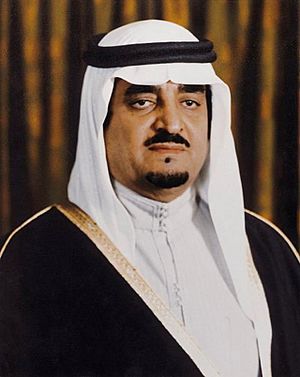
Official portrait, 1982
|
|||||
| King and Prime Minister of Saudi Arabia | |||||
| Reign | 13 June 1982 – 1 August 2005 | ||||
| Bay'ah | 13 June 1982 | ||||
| Predecessor | Khalid | ||||
| Successor | Abdullah | ||||
| Regent | Crown Prince Abdullah (1996–2005) | ||||
| Minister of Interior | |||||
| In office | 1962–1975 | ||||
| Predecessor | Faisal bin Turki I | ||||
| Successor | Nayef bin Abdulaziz | ||||
| Prime Minister | |||||
| Minister of Education | |||||
| In office | 1953–1962 | ||||
| Predecessor | Office established | ||||
| Successor | Abdullah bin Saleh bin Obaid | ||||
| Prime Minister | King Saud | ||||
| Born | 1920, 1921 or 1923 Riyadh, Nejd |
||||
| Died | 1 August 2005 (aged 82–85) King Faisal Hospital, Riyadh |
||||
| Burial | 2 August 2005 Al Oud cemetery, Riyadh |
||||
| Issue |
List
Faisal bin Fahd
Khalid bin Fahd Muhammad bin Fahd Saud bin Fahd Sultan bin Fahd Abdulaziz bin Fahd Latifa bint Fahd |
||||
|
|||||
| House | Al Saud | ||||
| Father | King Abdulaziz | ||||
| Mother | Hassa bint Ahmed Al Sudairi | ||||
Fahd bin Abdulaziz Al Saud was a very important leader in Saudi Arabia. He was the King and Prime Minister of Saudi Arabia from 1982 until he passed away in 2005. Before becoming King, he was the Crown Prince of Saudi Arabia, which means he was next in line to the throne, from 1975 to 1982. He was the eighth son of King Abdulaziz, who founded modern Saudi Arabia.
Fahd was the oldest of the Sudairi Seven, a group of brothers who were all sons of King Abdulaziz and Hassa bint Ahmed Al Sudairi. He worked as the Minister of Education from 1953 to 1962. Later, he became the Minister of Interior from 1962 to 1975. He became Crown Prince when his half-brother Khalid became King in 1975. Fahd was seen as the main leader of the country during King Khalid's rule because King Khalid was often unwell.
When King Khalid died in 1982, Fahd became King. He is known for introducing the Basic Law of Saudi Arabia in 1992, which is like a constitution for the country. In 1995, he had a serious stroke and could not do all his official duties. His half-brother, Crown Prince Abdullah, then took over many of the daily tasks. Abdullah became King after Fahd's death in 2005. King Fahd ruled for 23 years, making him the longest-reigning Saudi king.
Contents
Early Life and Education
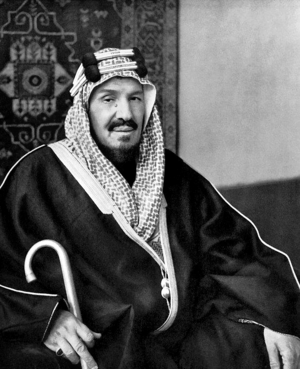
Fahd bin Abdulaziz was born in Riyadh, Saudi Arabia, in the early 1920s. He was the eighth son of King Abdulaziz and the oldest son of his mother, Hassa bint Ahmed Al Sudairi. Fahd and his six full brothers are known as the Sudairi Seven.
Fahd went to the Princes' School in Riyadh. This school was created by King Abdulaziz especially for the royal family members. Fahd studied there for four years. He then continued his education at the Religious Knowledge Institute in Mecca, where he learned about Islamic studies.
Early Political Career
Prince Fahd became a member of the royal advisory board early in his career. In 1945, he made his first official trip to San Francisco for the signing of the UN charter. He worked under Prince Faisal, who was the foreign minister at the time.
In 1953, Fahd led his first official state visit. He attended the coronation of Queen Elizabeth II in London, representing Saudi Arabia. On 24 December 1953, he was appointed as Saudi Arabia's first Minister of Education.
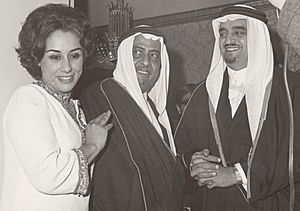
Prince Fahd became more important in the government. In 1959, he led the Saudi group to the League of Arab States. In 1962, he was given the important job of Interior Minister. As Interior Minister, he led the Saudi group at a meeting of Arab leaders in Egypt in 1965. He also became a member of a special council created by King Faisal to help with succession matters.
In 1967, Prince Fahd was named second deputy prime minister. This new position was created because Crown Prince Khalid did not want to lead the council of ministers all the time.
Becoming Crown Prince
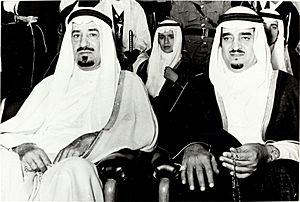
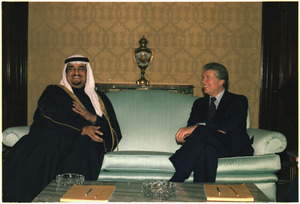
After King Faisal passed away in 1975, King Khalid took the throne. Fahd was then named first deputy prime minister and Crown Prince. Even though he had older half-brothers, Fahd was chosen because he had a lot of experience. He had been Minister of Education and Minister of Interior.
Being both Crown Prince and first deputy prime minister made Fahd a very powerful person. During this time, Crown Prince Fahd was part of a small family council led by King Khalid. This council helped make important decisions for the country.
King of Saudi Arabia
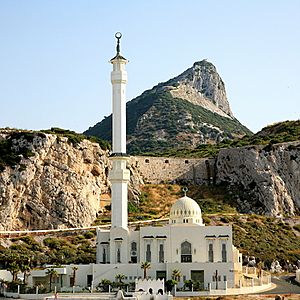
When King Khalid died on 13 June 1982, Fahd became the fifth King of Saudi Arabia. In 1986, King Fahd changed his title to "Custodian of the Two Holy Mosques". This title shows his role as a protector of Islam's holiest sites.
During his rule, the price of oil went down a lot. This meant Saudi Arabia had less money from oil. Some people called his reign an "era of saving money" compared to the richer times before him.
Foreign Relations
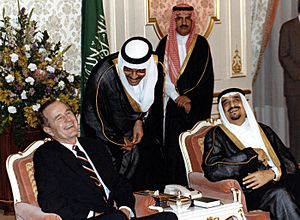
King Fahd was worried that the 1979 Revolution in Iran might cause similar problems in Saudi Arabia. After becoming King in 1982, he gave a lot of money to support Saddam Hussein's Iraq in its war with Iran.
Fahd supported the United Nations. He also gave a lot of foreign aid, about 5.5% of Saudi Arabia's national income, through various funds. He helped groups like the Bosnian Muslims during the Yugoslav Wars. King Fahd also strongly supported the Palestinian cause and was against the State of Israel.
King Fahd worked to solve problems between Arab countries. He helped create the Taif Accord in 1989, which ended the conflict in Lebanon. He also led the Arab world against Iraq's invasion of Kuwait. He became good friends with Syrian President Hafez al-Assad and Egyptian President Hosni Mubarak.
Islamic Activities
King Fahd took steps to support the traditional Saudi religious community. He spent millions of dollars on religious education. He also made the separation of men and women stronger and gave more power to the religious police.
Gulf War, 1991
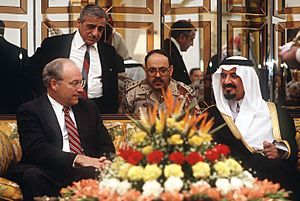
In 1990, Iraqi forces led by Saddam Hussein invaded Kuwait. This placed the Iraqi army very close to Saudi Arabia's border. King Fahd agreed to let American-led troops stay in Saudi Arabia. This decision caused some people in Saudi Arabia to criticize him because they did not want foreign troops on their land.
Changes and Development
King Fahd did not like reformists who wanted big changes. In 1992, a group of thinkers asked King Fahd for reforms, like more political representation and less wasteful spending by the royal family. King Fahd first ignored them, and when they kept asking, some reformists were punished or lost their jobs.
During King Fahd's rule, the royal family spent a lot of the country's money. A very large military contract, the Al-Yamamah arms deal, was signed during his time. This deal cost Saudi Arabia billions of dollars. These funds were originally meant for building hospitals, schools, and roads. Because of this, Saudi Arabia's infrastructure development slowed down from 1986 until 2005.
King Fahd also created a Supreme Council of Islamic Affairs in 1994. This council was led by senior family members and experts. Its goal was to oversee Islamic activities related to education, economy, and foreign policy.
Health and Later Years
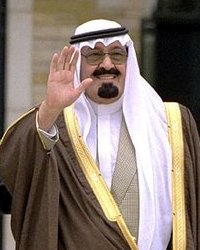
King Fahd had some health issues, including arthritis and diabetes. On 29 November 1995, he suffered a serious stroke. After this, he became very weak and decided to let Crown Prince Abdullah manage the country's daily affairs.
After his stroke, King Fahd was not very active. He often used a cane or a wheelchair, but he still attended some meetings and met with important visitors. Crown Prince Abdullah took most of the official trips. When King Fahd traveled, it was usually for vacations.
In 2003, King Fahd spoke out against terrorism. He urged Muslim religious leaders to preach about peace, safety, cooperation, justice, and tolerance.
Wealth and Lifestyle
King Fahd was known for his great wealth. In 1988, he was reported to be one of the richest people in the world. He owned palaces in Saudi Arabia and a large palace in Marbella, Spain, which made the area famous.
He enjoyed a luxurious lifestyle. He had a very large yacht, the Prince Abdulaziz, which was 147 meters long. This yacht had two swimming pools, a ballroom, a gym, a theater, and even a hospital. The King also had a private Boeing 747 jet.
Family Life
King Fahd was married many times and had six sons and four daughters. His sons include:
- Faisal bin Fahd (1945–1999), who was in charge of youth welfare.
- Muhammad bin Fahd (born 1950), who was a governor.
- Saud bin Fahd (born 1950), who worked in intelligence.
- Sultan bin Fahd (born 1951), a retired army officer.
- Khalid bin Fahd (born 1958).
- Abdulaziz bin Fahd (born 1973), his youngest son.
One of his daughters, Latifa bint Fahd, passed away in 2013. Another daughter, Al Jawhara bint Fahd, passed away in 2016.
Death and Funeral
King Fahd was admitted to the King Faisal Specialist Hospital in Riyadh in May 2005. He passed away on 1 August 2005, at the age of 84. The news was announced on state television.
His funeral prayers were held at the Imam Turki bin Abdullah Mosque in Riyadh on 2 August. His body was then carried to the Al Oud cemetery in Riyadh. This is a public cemetery where other Saudi kings and royal family members are buried. Only family members and Saudi citizens were present at the burial itself.
Many Arab and Muslim leaders offered their condolences. Saudi Arabia declared a three-day period of national mourning. Many other countries also declared mourning periods to honor the late King.
Honors and Awards
| Styles of King Fahd |
|
|---|---|
 |
|
| Reference style | Custodian of the Two Holy Mosques |
| Spoken style | Your Majesty |
King Fahd received many awards and honors from different countries around the world. These show his importance in international relations.
| Ribbon | Country | Honor | Year |
|---|---|---|---|
| Azerbaijan | First Class of the İstiqlal ordeni | 2005 | |
| Bahrain | Collar of the Order of Al Khalifa | 1995 | |
| Denmark | Knight of the Order of the Elephant | 1984 | |
| Iraq | Grand Cordon Order of the Two Rivers | 1987 | |
| Italy | Knight Grand Cross with Collar Order of Merit of the Italian Republic | 1997 | |
| Kuwait | Collar of the Order of Mubarak the Great | 1991 | |
| Kuwait | Collar of the Order of Kuwait | 1994 | |
| Malaysia | Honorary Grand Commander of the Order of the Defender of the Realm | 1982 | |
| Morocco | Grand Cordon Order of the Throne | 1996 | |
| Spain | Collar of the Order of Civil Merit | 1977 | |
| Sweden | Knight of the Royal Order of the Seraphim | 1981 | |
| United Arab Emirate | Collar of the Order of Etihad (Order of the Federation) | 1994 | |
| United Kingdom | Royal Victorian Chain | 1987 | |
| United Kingdom | Knight Grand Cross of the Order of St Michael and St George | 1999 |
In 1984, King Fahd also received the Faisal Prize for Service to Islam.
Images for kids
See also
 In Spanish: Fahd bin Abdulaziz para niños
In Spanish: Fahd bin Abdulaziz para niños
- List of things named after Saudi kings
- List of covers of Time magazine (1970s)
- List of covers of Time magazine (1990s)
 | Percy Lavon Julian |
 | Katherine Johnson |
 | George Washington Carver |
 | Annie Easley |


